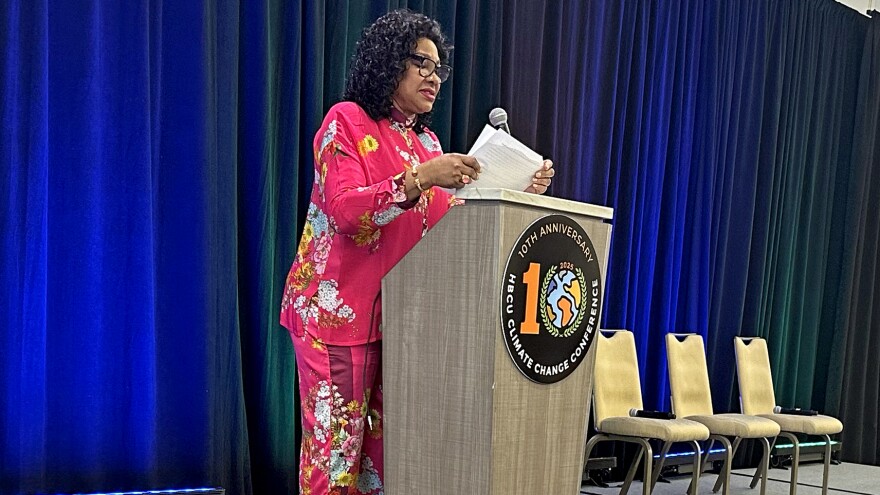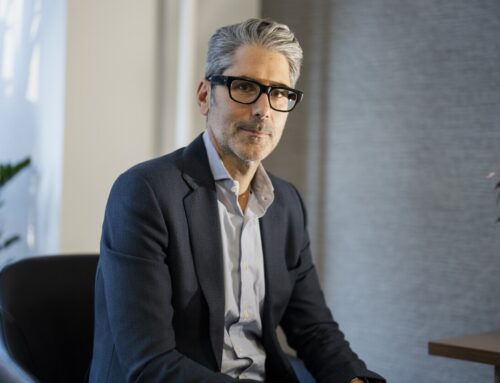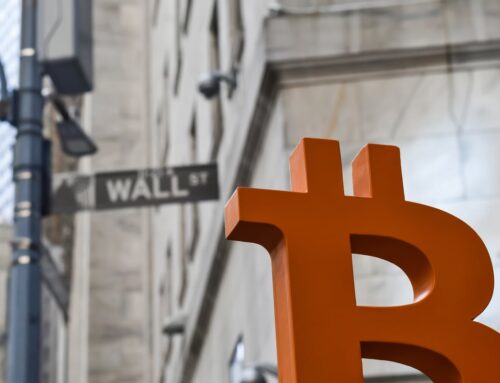How HBCUs are helping grow the next generation of Gulf South environmental activists
April 2, 2025
It’s the day after Mardi Gras, and people dressed in colorful prints walk into a conference room in a downtown New Orleans hotel. It feels like a mini celebration as two people on stilts make their way down a makeshift aisle towards the front of the room. Drummers follow behind them.
But the point of this isn’t to party. It’s to kick off the 10th anniversary of the HBCU Climate Change Conference, an event where students from historically Black colleges and universities, as well as from other academic institutions, come together to talk about environmental justice. It’s part of a larger effort in the Gulf South to develop the next generation of Black environmental justice leaders to help improve their communities.
“We like to mix cultural events at our conferences because we want to be grounded,” said Dr. Beverly Wright, one of the organizers of the conference. “The work that we do is so heavy. There’s a real need to have fun.” Throughout the conference, students share their research and goals for combating climate change.
Mersie Watkins, a senior biology major from Alcorn State University, an HBCU in Mississippi, is one of the students attending the conference. When she was younger, the environment was the last thing on her mind. But she’s from Duck Hill, Mississippi — a community that years ago would face flooding nearly any time it rained.

Danny McArthur
/
Gulf States Newsroom
She started working with Mississippi Communities United for Prosperity, a nonprofit back home, to address flooding with green infrastructure, like rain gardens to help reduce or treat stormwater.
“I saw what the environment was doing to my people,” Watkins said. “Ever since then, I’ve kind of been in the community, working on the environment.”
While at Alcorn, Watkins took part in the Environmental Protection Agency’s Environmental Justice Academy program. The nine month program is derived from the EPA’s collaborative problem solving model — which focuses on building capacity. While there, she was able to take what she learned as an activist and see how things worked on the government side.
Watkins presented her work in front of a room full of people as part of a student panel. Over the course of the five-day conference, students led panels on topics like green infrastructure, health disparities and water justice, and created posters demonstrating their research.
They also attend panels focused on topics like navigating equitable disaster response and recovery, using environmental data to drive community advocacy, coming up with solutions to environmental vulnerability in underserved communities and the impact climate change has on them.
Speakers included experts like The Weather Channel meteorologist Paul Goodloe and Texas Southern University professor Dr. Glenn Johnson, to environmental justice leaders like Robert Taylor of Concerned Citizens of St. John and Hip Hop Caucus president and CEO Rev. Lennox Yearwood Jr.

Danny McArthur
/
Gulf States Newsroom
The conference was founded by Wright, who at 77 has long been a pillar in the environmental justice movement in the Gulf South. Wright is also the founder of the Deep South Center for Environmental Justice, which hosts the conference in collaboration with the Bullard Center for Environmental and Climate Justice at Texas Southern University.
Dr. Robert Bullard, widely considered the father of environmental justice, co-founded the HBCU Climate Change Conference with Wright over a decade ago, inspired by the United Nations Climate Change Conferences that occurs yearly. Wright noticed that she didn’t see a lot of African-American students at those conferences.
“Dr. Bullard and I decided we’ve been going to all of these conferences… we need to find a way to involve our students and our faculty members and our communities in some of these events,” Wright said. “So, we formed the HBCU Climate Change Consortium.”
For their first conference, they only had $15,000 in funding and about 30 people in attendance. This year, Wright said there were 400 people registered to attend, with 36 HBCUs being active members of their HBCU Climate Change Consortium. The consortium started in 2011 to give HBCU students the chance to learn about climate change, policy and advocacy, and to present their research.
Wright said it makes sense for HBCU students to help lead the charge in addressing environmental injustice. Marginalized communities have often had to bear the brunt of environmental injustices, while also coming up with their own solutions. Many of the students who attend the conference come from impacted communities.
“If you look at any of the great inventions, it actually grew out of a need,” Wright said. “So it’s very likely that many of these students come from up river, for example, or other places that have been polluted.”

Danny McArthur
/
Gulf States Newsroom
This year, the conference took place amid a shifting federal landscape. Under the Biden administration, billions were dedicated to environmental justice, most notably through the Inflation Reduction Act. In an executive order soon after taking office in January, President Donald Trump vowed to strip much of it.
Recently, Democratic members of the U.S. Senate Committee on Environment and Public Works released a document listing 400 environmental grants targeted for termination. Among those included an $11 million grant that was given to the Deep South Center for Environmental Justice as a community investment recovery center.
Wright said the conference is playing the same role it always has, regardless of funding.
“That is to encourage students, to mentor them, to make sure they are aware of the problems that exist and to give them hope to continue,” she said. “This up and down support from the federal government has always been there.”
A lot of young people are depressed about what is happening in the U.S., Wright said, but the conference is showing them that they can find another pathway to achieve environmental justice.
One way to give younger students hope is by showing them the work that’s been done before them by elders and community leaders — like Major Joe Womack, who heads C.H.E.S.S., a nonprofit in Africatown, Alabama. During a panel, Womack and other leaders shared their successful strategies for collaborating with others to be more climate resilient. He also spoke on the importance of people getting involved in their communities.
“Africatown born and bred and damn proud of it,” he said. “I always say that because… I find a lot of people come from underserved communities and EJ communities, and they’re not proud of where they came from.”

Danny McArthur
/
Gulf States Newsroom
Young people are also being encouraged to get involved by going out in their communities and hearing stories from the people living with environmental struggles. That was the case for Christina Smokes, a high school senior from Gulfport, Mississippi, who’s originally from Atlanta. When she moved to Gulfport, she noticed that many residents had tarps on their roofs.
She didn’t know the meaning behind them until she got an internship with the Deep South Center for Environmental Justice to be a digital storyteller and interviewed people throughout her community.
“With this internship I was able to see that it was from disproportionate funding from the government for home repairs, from hurricane damages or flooding, anything like that,” Smokes said.
She’s at the climate change conference to share what she learned. She started to see the same pattern in many African-American and minority communities.
“You can just see the difference and it’s crazy. And it just almost angers me because of the injustices, just because of the skin color,” Smokes said.
She’s been inspired to get even deeper with environmental justice. Smokes interviewed one woman who had sinkholes in her yard, and she said the water pollutants were giving her respiratory issues.
Smokes always wanted to be a doctor, but now she sees the role societal factors like the environment play on people’s health, and wants to explore topics like that more in college.
This story was produced by the Gulf States Newsroom, a collaboration between Mississippi Public Broadcasting, WBHM in Alabama, WWNO and WRKF in Louisiana and NPR.
Search
RECENT PRESS RELEASES
Related Post


